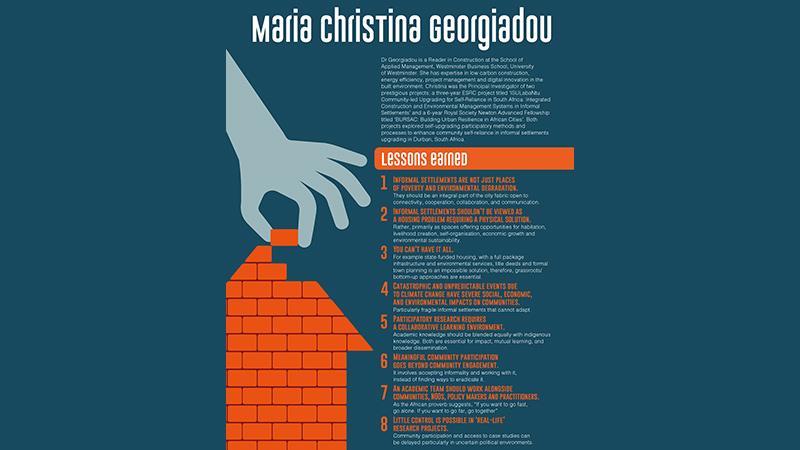Dr Maria Christina Georgiadou, a Reader in the School of Applied Management, has been included in the Newton Fund and the Global Challenges Research Fund (GCRF) ‘Lessons Earned’ campaign, which gives researchers space to talk about lessons they have learned over their life and career while tackling global challenges.

The Newton Fund aims to build research and innovation partnerships with African, Asian, and Latin American countries to support economic development and social welfare, tackle global challenges and develop talent and careers, whilst the GCRF supports UK and international researchers and innovators to take on key issues affecting developing countries.
‘Lessons Earned’ consists of a series of posters with lessons from Newton Fund and GCRF researchers and innovators. The posters include advice on personal values, ways to run successful projects, and on collaboration with fellow researchers worldwide.
The project is also the celebration of the Newton Fund’s and GCRF’s eight and six-year anniversaries respectively in 2022.
Christina has been chosen to take part after being the principal investigator of two successful projects: the ISULabaNtu project funded by the Economic and Social Research Council (ESRC) under the Newton Fund Urban Transformations Programme entitled ‘Community-led Upgrading for Self-Reliance in South Africa: Integrated Construction and Environmental Management Systems in Informal Settlements’; and a Royal Society Newton Advanced Fellowship entitled ‘Building Urban Resilience for Self-Reliance in African Cities’. Both projects have examined community-led, participatory methods and processes to improve community resilience and self-reliance in construction and environmental management systems in informal settlements in South Africa.
Christina’s research mainly focuses on low carbon construction, energy efficiency, project management and digital innovation in built environment. She has experience in leading multidisciplinary research projects and consultancy work in low carbon construction and low-cost housing.
She had the opportunity to communicate and share findings to a variety of practitioners and policymakers from the Director-General for Research and Innovation at the European Commission, Environment Agency, the NHS, local authorities in the UK and South Africa, the Royal Institution of Chartered Surveyors (RICS), Core Cities, 100 Resilient Cities, UN-Habitat, and the United Nations Development Programme (UNDP).
Speaking about her inclusion in the campaign, Christina commented: “I am delighted to participate in this campaign together with other 16 distinguished researchers and innovators from around the world. It is very exciting to see the impact of my projects unfolding over the past six years on meaningful community participation and accepting informality in South Africa. We hope to carry on our efforts through a next round of funding including the potential for implementation of digital strategies and technologies in the incremental upgrading space in the KwaZulu-Natal area”.
Before joining the University of Westminster, Christina was a Research Associate at the Centre for Sustainable Development at Cambridge University’s Engineering Department. She also holds a PhD in Energy Efficiency in the Built Environment from Cambridge, entitled ‘Future-Proofed Design of Low-Energy Housing Developments: Conceptual Framework and Case Studies from the UK and Sweden’. Since 2017, she has been a Senior Fellow of the Higher Education Academy (SFHEA).
Learn more about Construction, Surveying and Real Estate courses at the University of Westminster.


